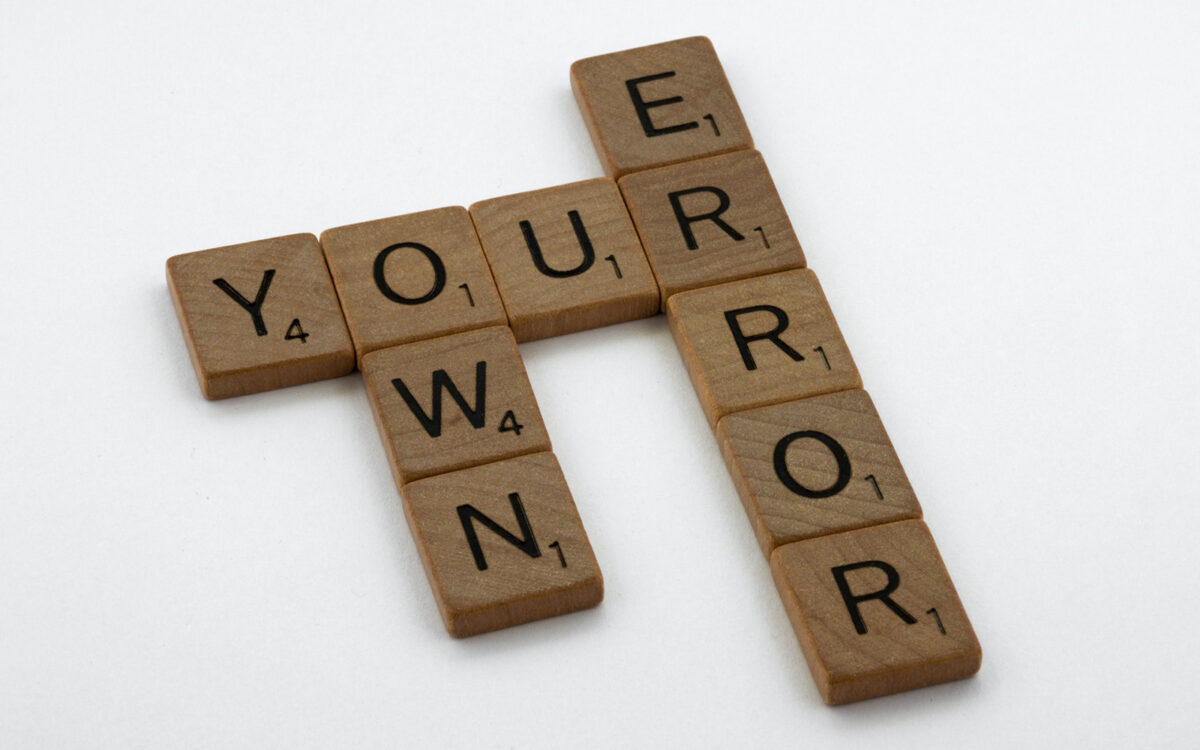Whether it is on a personal or professional level, we all know mistakes happen. From a cognitive perspective, we understand that it is how we respond to the mistake that is paramount to preserving our own integrity and satisfying the offended party. However, like many things in life, we might know why we should respond a certain way, but how to do so remains a bit unclear. And what may be even more unclear in the process is what can be gained by truly owning your mistakes.
A mistake can be defined as an improper action or statement stemming from faulty judgment, inadequate knowledge, or poor attention. It can be debated that for something to be considered a mistake the impropriety itself should be unintentional and committed without malice. While I am not sure that is always the case, I do believe a mistake is something from which we should seek to learn and build. And, as such, it should be something we consciously endeavor to not repeat.
One of the most common misconceptions is that mistakes are a bad thing. A mistake is neither good or bad. It is simply the result of a misstep in action or judgment. The mistake itself is a notification that there is something amiss in the process that needs to be addressed. Being made aware that adjustments are needed should be seen as a positive. Think of it this way: wouldn’t you rather know than not?
Understanding why mistakes occur is part of the process of mitigating them moving forward. Mistakes most often occur when we are emotionally or physically fatigued, ill-prepared, stressed, over-committed, or there is a communication breakdown. All of these factors come down to making sure you have a healthy process in place for managing your personal and professional life and that you regularly check in on and evaluate the efficacy of that process.
When a mistake occurs for which you are the offending party, your goal should be to turn the mistake into an opportunity. This may sound counter-intuitive given what a mistake implies, but remember that it is about how you respond. It is not about “damage control” or “fixing” a problem. And it is not about minimizing exposure and controlling the narrative. Your response to a mistake, whether it is on a personal or professional level, should be seen as an opportunity to solidify a relationship with the offended party. It is an opportunity to evaluate and better understand your process. It is an opportunity to implement strategies to avoid future mishaps. It is an opportunity to demonstrate your ability to lead and inspire. And it is an opportunity to deliver excellence.
With all this in mind, here are a few ways to effectively own a mistake and turn it into an opportunity:
- Acknowledge the mistake. This may sound a bit obvious, but the simple act of admitting that an error has occurred serves to demonstrate your willingness to take accountability for it and simultaneously acknowledges the feelings and concerns of the offended party. Part of this step includes taking responsibility. Yes it occurred. And, yes, you are responsible. Accepting responsibility means you are willing to explore and seek to understand what went wrong and that you’re focused on achieving the best possible resolution.
- Be a listener. Listening to the offended party is as much for you as it is for them. For them, it makes them feel cared about and it provides a platform to which they can express their grievance. For you, it provides invaluable feedback and information to attain a positive resolution and to affect positive change moving forward. It also affords you the ability to fortify a relationship by providing an excellent response to the current situation.
- Take Extra Action. When a mistake has occurred, in essence, you have underperformed or performed in error. It happens. And now you have an opportunity to provide a satisfactory response. You have three choices. Your response can be inadequate to, equivalent to, or in excess of the grievance. Again, it is an opportunity to make a statement about your integrity and commitment to excellence and genuine interest in creating a healthy relationship with the aggrieved party. If you order take out from a restaurant and upon returning home realize that they forgot to include one of the meals, you are likely to call and get a refund or replacement. Choosing a replacement meal, you return to the restaurant to pick up the forgotten meal. If the restaurant is unapologetic and gives you the meal (now cold) that they forgot to put in your bag and sends you one your way, how would you feel? My guess is that you are not likely to return. Alternatively, if they are apologetic and let you know they made a fresh meal, you probably feel a bit better because the response is equal to the mistake. But, if they make you a fresh meal and then throw two desserts in there to apologize for the mistake and inconvenience, you feel like a valued customer that they do not want to lose. Taking the extra action reinforces your commitment to excellence and demonstrates that you truly value the other party.
- Evaluate and Adjust. Once you have acknowledged the mistake, listened, and taken extra action to resolve the immediate matter, it is time to go back and evaluate what went wrong and why and make corrections to your process. If your restaurant forgot to include a meal, it’s important to know why. If the meal was never on the original ticket then the problem occurred during the order taking and confirmation process and that can be evaluated. If the order was received and made but never made it into the bag, then the issue occurred in the bagging and quality control stage. Whatever the timing and route cause, because you listened and then evaluated, you are now in a position to make the necessary adjustments to the process.
Whether it is a personal or professional challenge, these four steps can be used to navigate nearly any mistake. Not to sound cliché’ but mistakes are a part of life and business. If we treat them like an opportunity and own them with enthusiasm, they will only serve to improve all aspects of our lives.
For more information about this subject and all aspects of The BUILD Framework®, consider getting a free copy of my book: https://johnpeitzman.com/free.








